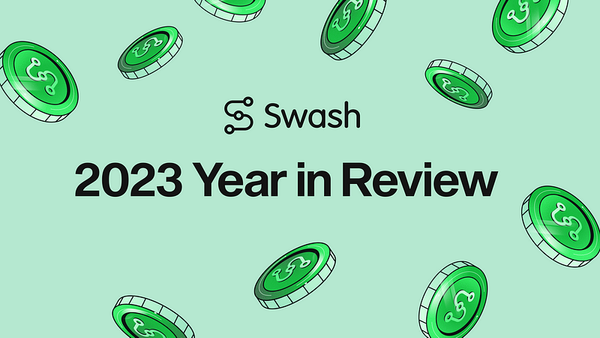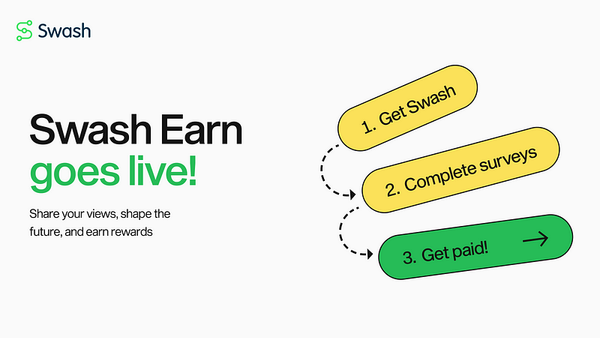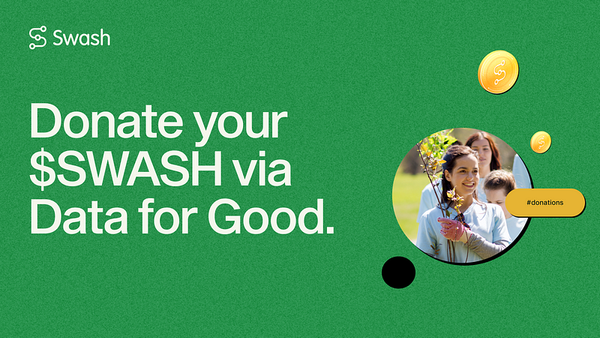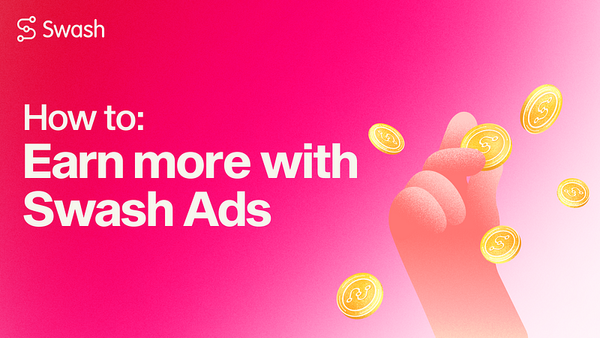AMA Recap: Swash meets Cryp2Gem
This Tuesday, Swash’s CMO met with Cryp2Gem, a community of people interested in crypto, research, and trading.
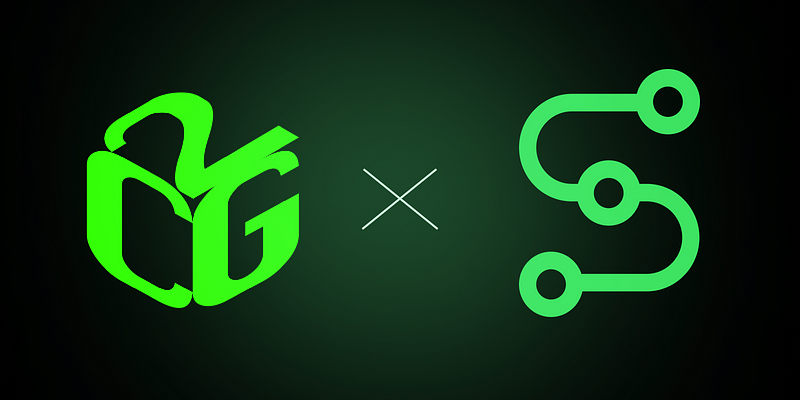
This Tuesday, Swash’s CMO met with Cryp2Gem, a community of people interested in crypto, research, and trading.
The community was eager to learn more about Swash, while the AMA covered everything from Swash’s technology to its approach to data privacy and regulations.
Check the full chat below and make sure to check out the research piece published by Cryp2Gem earlier in the week.
“Reimagining data ownership” is Swash’s motto. What does it mean to you?
Chloë:
Great question. What we want to do with Swash is to provide the environment and culture to enable a way for people, businesses, and developers to unlock the latent value of data by pooling, securely sharing, and monetising its value.
The ‘reimagining’ part comes from our motivation to find alternative ways of doing things. We don’t have to stick with the existing status quo if it doesn’t work. The current system relies on shady, extractive methods which aren’t sustainable or beneficial for most of us. We want to change that.
Swash launched as a technical experiment at Mozilla Festival in 2019 to introduce the Swash app browser plugin that captures your data as you browse the web. It gives you ownership of your data, sells your data and rewards users with a fair incentive. Are you happy with the current traction and user base?
Chloë:
Yes, Swash has attracted over 60 thousand people already! That happened mainly as a result of our referral program, partnerships, events, and media features. The user base is committed to Swash and our community is active in sharing feedback and boosting word of what we’re up to, so the only goal now is to keep growing. The more people who join and contribute to the Swash Data Union, the more valuable the data will become.
Great. You just mentioned secure sharing, and I wanted to ask by which mechanism does Swash secure sharing work?
Chloë:
Securely sharing the data basically means that, not only do we follow the standards and processes set out in our Data Protection Impact Assessment (DPIA — part of UK GDPR), but we also have technical measures in place too. This includes anonymising the data, end-to-end encryption, and giving users control over what data they decide to share (through different UX features). Also, an important detail to add — Swash doesn’t collect any sensitive data or anything that can be used to personally identify you.
Swash app users are currently earning Streamer DATA tokens. Will that change with the launch of the native SWASH token?
Chloë:
Yes, people will earn the SWASH token instead.
How much fees does Swash take when captured users data with the app is sold?
Chloë:
With the browser application, Swash has 30%. The other 70% is redistributed out to members. This may vary slightly with new products and services but the priority to redistribute value back to people remains.
You have already mentioned Data Unions, so let’s get back to that. Swash is the first real-life and largest example of a Data Union (built on Streamr). Could you explain to our audience what a Data Union is and why is it essential for the end-user?
Chloë:
So a Data Union is sort of analogous to a ‘Data Trust’ or ‘Data Cooperative’. It’s an organised structure that works to manage and protect the interests of its members. As a result, those members have greater power and control over how their data is collected, accessed, and used while receiving a portion of the profits generated.
By rewarding people for the value of their data, people can earn for activities they already do online — like surfing the web — enabling individuals to practice their data rights while celebrating their role as essential value providers in a thriving network.
If you’re interested, this interview with Jaron Lanier and Lex Fridman went live recently and they spent a good chunk of time discussing Data Unions and surrounding concepts around the 50 minute mark!
Swash builds an entire data ecosystem and develops a full data technology stack to potentially mainstream a new data economy. At what stage are you currently, development-wise? When can we expect to see and use the first products on your mainnet?
Chloë:
In terms of our development roadmap, we’re at the Rise stage which is focused on the growth of the browser application. You can install and start using it already! It takes just a few minutes to get set up and is available on all major browsers.
Next, towards the end of the year, we’ll be building out the sIntelligence platform. More details can be found in our whitepaper.
Based on the whitepaper, Swash will initially launch three complementary platforms apart from Data Unions: sIntelligence (business intelligence and analytics platform); sApps (apps and services built on Swash); and sCompute (data computation). This is when Swash should see more business clients onboarding and developers building first sApps with Swash SDK. Do you see those products launched as catalysts for exponential ecosystem growth and more use cases and price drives for SWASH tokens?
Chloë:
Yes, the First Wave Solutions that you listed are the products and services that will be launched as part of the new evolution of Swash. They have been chosen out of many ideas to meet the needs of the ecosystem actors (people, businesses, and developers) in a way which will bring the most value to everyone.
Each of them address gaps in the current system in their own ways, but driven by what we call Swash Key Principles — to incentivise, access, build, and collaborate. All of them prioritise incentive mechanisms and ease-of-use to ensure that even non-crypto savvy audiences can benefit as we believe that’s the biggest hurdle to mass adoption currently. We don’t all have crypto but we do have data.
Naturally, as adoption of the ecosystem grows, as will the value of the Swash Data Union and likely the token too.
On which data marketplaces is the data collected by Swash sold currently? Do you have any plans to offer data on centralised marketplaces like AWS Data Exchange?
Chloë:
Swash is available on Streamr and Ocean Protocol marketplaces but also more ‘traditional’ ones too. This is something we will continue expanding as we go.
That sounds great. Looking forward to hearing more about the grant you got from Ocean Protocol in the future. Congrats for that btw :) You have already addressed the importance of data privacy and data regulations compliance. With regulations like GDPR and CCPA, data protection laws are more and more strict. What will make Swash compliant with all the data regulation laws?
Chloë:
Great question. I mentioned it briefly already, but Swash has completed a Data Protection Impact Assessment (DPIA) for the Information Commissioner’s Office (ICO) here in the UK. It’s basically used to ensure that data is being handled in the proper manner from a GDPR perspective.
Also, Swash is very transparent about the types of data being collected (within the privacy policy) and gives people an easy way to opt-in/opt-out when suits them. For example, the browser application has a small popup box which you can use to quickly see your earnings and easily access different parts of the application, but it also has a toggle which you can use to switch Swash off for certain sites if you wish. That’s just one of several different UX features — I recommend you check out the ‘Data’ tab in the extension to explore it more.
You have recently joined the Data Privacy Protocol Alliance (DPPA) as a founding partner along with a group of 20 other companies. What do you expect from this newly created alliance?
Chloë:
The DPPA is an organisation of people and entities who want to create a more sustainable data future. As we’re all driven by the same mission, it’s about setting standards and transparency and establishing what needs to be done and how we can support this movement going forward. It’s wonderful to be part of something like this with so many like-minded people!
Swash attended several blockchains and decentralised data solution-focused events such as the World Ethical Data Forum 2021, MyData Online 2020, ETHDenver19, and Outlier Venture’s Diffusion Digital. Could you highlight a single event that made the best impression on you and tell us why?
Chloë:
Interesting question! I have to say, I enjoyed them all. I think the WEDF event stands out to me the most though, simply because the types of discussions were very broad and visionary. They really approached data from all angles, covering everything from technology to regulation but also bringing in science-fiction authors and artists too. I think it’s so valuable to bring in a range of opinions and perspectives when we’re discussing things like data as it affects every single one of us.
Swash was part of Outlier Ventures Base Camp 3 Accelerator Summer Cohort 2020. This has probably led to some great partnerships within this ecosystem. Could you describe to us your experience and relationship with Outlier Ventures?
Chloë:
Sure, so as part of the cohort, Outlier supported us with getting off the ground and ongoing support like networking, partnerships, and promotions. They’re very supportive of Swash in general and it’s good to be part of their portfolio alongside the likes of Brave, Chainlink, DIA, Boson, and Fetch.ai.
How do we know Swash does not collect any sensitive data like emails, passwords, etc?
Chloë:
You can check the privacy policy (within the extension) for the full breakdown of what Swash does capture. Also, if you want to be extra sure, you can mask keywords within the ‘Data > Text Masking’ section of the extension. You could include your name or email here and Swash will completely ignore those words and phrases.
Is Swash working with governments and/or territorial administrations? Trying to find a common path where regulations, business needs but also privacy and data ownership come together.
Chloë:
I agree, and this is something we’re already seeing with the EU Data Governance Act and the research conducted by the likes of Mozilla and the Open Data Institute. Swash has been featured as an example of a ‘bottom-up’ institution.
The issue with regulation is that it can be slow, and technology moves much faster. Swash is a way for people to meet tech with tech.
About Swash:
Swash is an ecosystem of tools and services that enable people, businesses, and developers to unlock the latent value of data by pooling, securely sharing, and monetising its value.
People share their data to earn while retaining their privacy. Businesses access high-quality, zero-party data in a sustainable and compliant way. Developers set up and build systems within a collaborative development framework with ease.
Swash is reimagining data ownership by enabling all actors of the data economy to earn, access, build and collaborate in a liquid digital ecosystem for data. Stay tuned for the latest updates on the IDO.
Let’s connect: Twitter | Telegram | Reddit | LinkedIn | Website | Newsletter
Originally published at https://swashapp.io on September 23, 2021.


